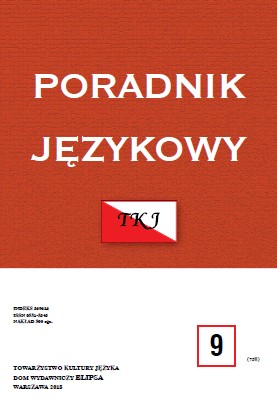CZY SZOK MOŻE BYĆ POZYTYWNY? O WYRAŻENIU SZOK WE WSPÓŁCZESNEJ POLSZCZYŹNIE
CAN SHOCK BE POSITIVE? ON THE EXPRESSION SZOK (SHOCK) IN THE CONTEMPORARY POLISH
Author(s): Mariola WołkContributor(s): Monika Czarnecka (Translator)
Subject(s): Theoretical Linguistics, Syntax, Lexis, Semantics, Western Slavic Languages, Philology
Published by: Dom Wydawniczy ELIPSA
Keywords: Shock; Polish language; Lexical/semantic properties of the word; Euphoria; Syntactic properties;
Summary/Abstract: This paper is dedicated to analysing lexical (mainly semantic) properties of the Polish expression szok (shock) in its secondary meaning, that is a meaning different from the primary one, where this word refers to strong emotions most often caused by a negative incident. The ‘shock’ that is described in this text is often related to positive events and is sometimes close to euphoria. The undertaken analysis focuses on szok, more precisely: a linguistic unit including the word and, to a lesser extent, the corresponding verb zszokować / zaszokować kogoś czymś (to shock someone with something). The analysis encompasses issues related to identifying a linguistic unit which represents the relevant notion, its syntactic properties and a description of its meaning. The analysed unit is additionally compared to verbs representing notions of surprise, bewilderment and amazement. The text is concluded with an attempt to explicate sentences which contain the expression ktoś jest w szoku, że_ (someone is in shock that_).
Journal: Poradnik Językowy
- Issue Year: 2018
- Issue No: 09
- Page Range: 37-51
- Page Count: 15
- Language: Polish
- Content File-PDF

